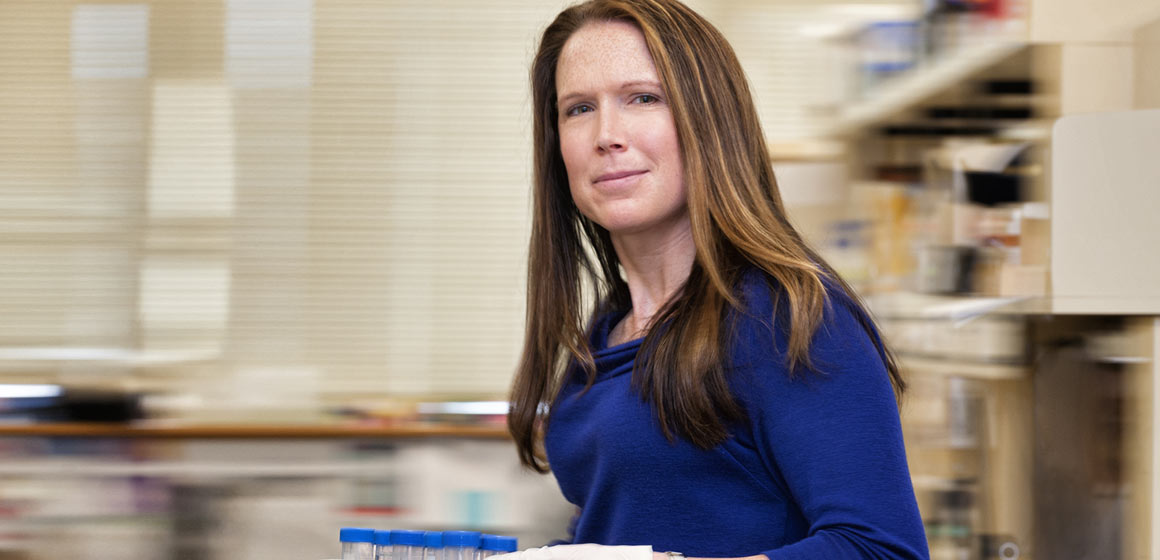 Monday 3 February 2014 2:33pm
Monday 3 February 2014 2:33pmCould the humble aspirin be effective in the fight against breast cancer?
The science of genetics has dramatically shaped our understanding of breast cancer, notably, enabling the identification of inherited predisposition. But, as the Department of Biochemistry's Dr Anita Dunbier explains, genetics can also reveal secrets about the tumours themselves – secrets that may potentially lead to more effective therapeutic strategies.
“When cancer develops the normal genes in the tumour cells get altered – that's what makes them misbehave. And, in any one tumour, there will be different cancer cells with different DNA changes. It helps us understand why fighting cancer is so hard; two tumours may look similar, but you're actually fighting many different foes.”
Dunbier likens the genetic variances of individual breast tumours to fingerprints, but adds that the advances in genetic sequencing mean the DNA differences between tumours can now be identified.
“These changes can also provide clues into what their Achilles heel might be and which drug they'll respond to,” says Dunbier, whose current research focuses on one potential Achilles heel – the way in which a tumour's cells interact with the body's immune system.
“Some cancer cells get help from other cells in the body. Even a body's immune cells can help tumour cells to grow. We have found that the number and type of immune cells surrounding tumour cells predict how well the tumours respond to anti-oestrogen drugs.”
Anti-oestrogen drugs are currently a staple treatment for breast cancers, 80 per cent of which are oestrogen-receptor positive. Some of these treatments block the synthesis of oestrogen in the body, effectively starving the tumour of its hormonal sustenance.
“That stops cancer cells from growing, but the tumour cells then send out help signals and the body's immune cells rush to their aid. So what we're trying to do is stop the ambulance coming to help.”
"We have found that the number and type of immune cells surrounding tumour cells predict how well the tumours respond to anti-oestrogen drugs.”
Dunbier hopes that the humble aspirin – no longer under patent and therefore often overlooked by researchers – may prove an effective ambulance-stopper. Published studies, she says, have shown that women taking aspirin, typically for cardiac or stroke prevention reasons, were less likely to develop breast cancer than others who weren't. Equally, women with breast cancer who took aspirin appeared half as likely to have it recur.
“Surprisingly, aspirin is still not recommended as standard treatment. That's because people don't understand how or why it works. We think one of its effects could be to block the body's immune cells.”
Dunbier's team has started clinical trials, together with the University of Otago, Christchurch's Professor Bridget Robinson, in which aspirin is given to breast cancer patients in combination with anti-oestrogen treatment. The researchers will monitor response to treatment by examining biopsy samples taken pre- and post-treatment.
Interestingly, their methodology also aims to overcome the obvious challenges of determining the long-term efficacy of the test treatment in preventing the cancer's return.
“Instead of waiting, say, 10 years for an outcome, we use a biomarker to identify changes that occur at the molecular level over a two-week period. It's a surrogate for the long-term response at body level: we know that a positive response to treatments at the molecular level over a two-week period is indicative of how patients' bodies will respond over many years.”
Dunbier, who was awarded a University of Otago Early Career Award for Distinction in Research in 2014, is also developing tests to predict whether women with breast cancer require chemotherapy or can just receive anti-oestrogen therapy. A third project is focusing on three newly identified breast cancer genes that are potential targets for therapeutics.
2014 Early Career Awards for Distinction in Research
Funding
- Health Research Council
- New Zealand Breast Cancer Foundation
- Breast Cancer Research Trust
- University of Otago Early Career Award for Distinction in Research